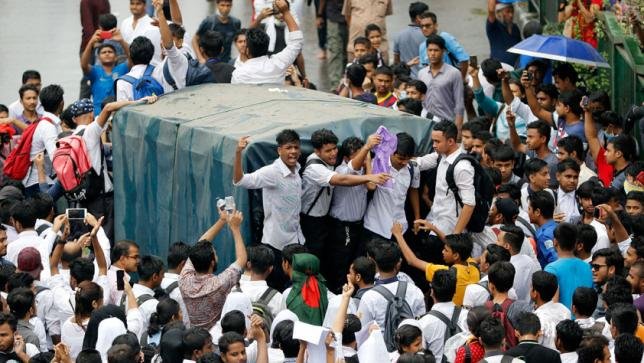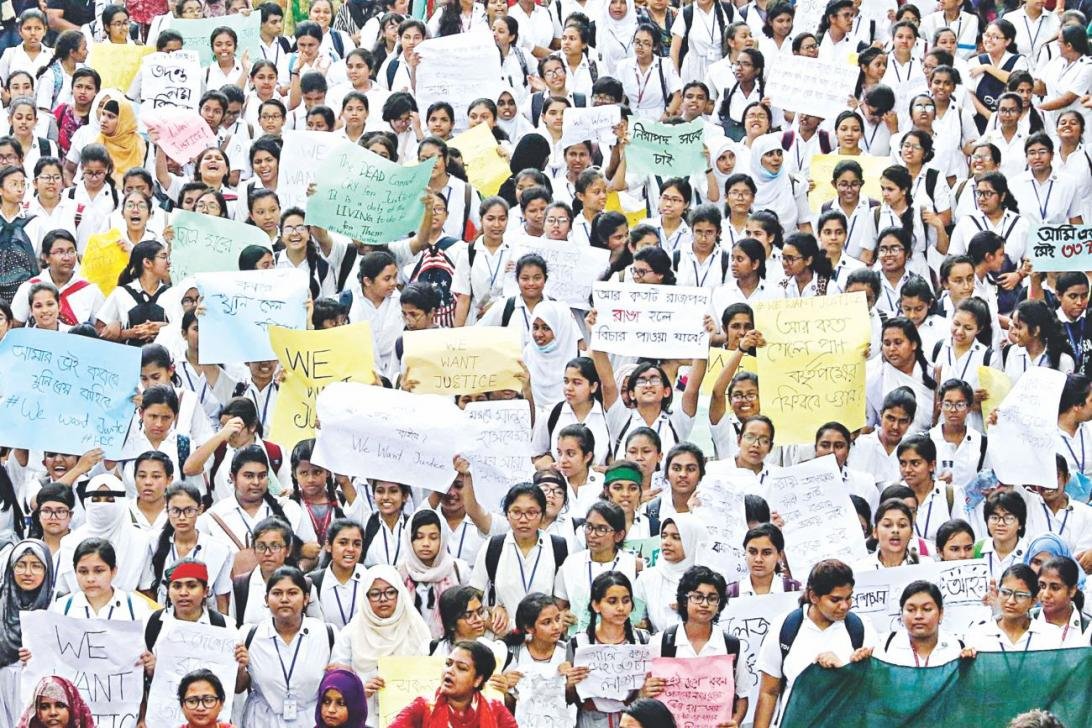Hindustan Surkhiyan Desk:In Bangladesh it is easy to pass a law and then forget about its implementation and making any real effort to correct the system.
This is exactly how the government now is trying to pacify the students who have for the last five days ruled the streets in protest against a rotten transport system, checking for unlicensed drivers and vehicles.
The road transport and bridges minister’s announcement that a new transport law will be passed in the next parliament session to fix the crisis is not only a mockery of the situation prevailing in our transport sector but also brings to the fore the questions of whether the existing laws are inadequate to tackle the road anarchy and whether passing of a mere law will change the situation.
Our answer is an emphatic NO and this is why we think so.
In the first place, the provisions in our existing Motor VehicleS Ordinance 1983 is stringent enough to ensure a safe transport sector.
It has outlined in clear terms how registration, fitness certificates of vehicles will be issued, who will get driving licence and who will be authorized to be ‘conductors’ of public transports.
To get a driving licence, a person has to be of a minimum age of 18 and has to provide medical certificates in support of mental and physical soundness. Rules have been laid down about what kind of driving tests one has to pass to get a licence.
A conductor has to obtain a licence too through a clearly termed process and each transport worker has to have appointment letters.
In reality, none of these are followed. Most public transport drivers, a significant portion of whom are below the age of 18, now sit in the driving seats and police turn a blind eye to the flagrant violation as part of a systematic corruption.
Of the 50 lakh vehicles running in the country about 20 lakhs have no fitness certificates and a similar number of drivers have no licences. The police know it very well and let the system continue because any illegal act means illegal earning for them. Here public safety does not count and the law does not mean anything.
Although fitness assurance is a vital part of road safety, the matter has largely been ignored by the Bangladesh Road Transport Authority (BRTA), There are only three digital inspection centres for Dhaka city where 11 lakh vehicles ply. So one can imagine how the fitness scanning is being done and how the certificates are obtained in exchange for money.
Again, the law here is again meaningless for lack of enforcement and corruption.
Now let’s look at the sweeping authority that the existing law gives to the law enforcement agency.
A policeman can arrest anyone on the spot without warrant if their vehicles do not have registration, road permit or fitness certificate. Similarly, a policeman can arrest anyone for reckless driving, driving under influence, speed racing or carrying weight in excess of permissible limits.
For such crimes the drivers can be punished for up to six months in prison and fines of different amounts up to Tk 25,000.
And in case of an accident causing death by rash driving or by negligence, the driver can face between three and five years of prison term and fines under the penal code.
Causing deaths in road accidents can count as culpable homicide punishable by life term.
And again all these laws could not bring any order on the road and each year over 7,000 people die in accidents mostly for reckless driving, unfit vehicles and unauthorized driving. Here the presence of a mere harsher law could make no difference because of the lack of enforcement bred by rotten governance. And harsher law will only breed more corruption.
There are plethora of examples that enactment of mere laws cannot change the situation if the system is corrupt. We have not been able to ensure safe food despite having stringent laws that threatens even death to food adulterers under the Special Powers Act. Drugs like yaba have infiltrated into the society like the tentacles of the octopus although we have a good narcotics control act.
In the last ten years, 371 laws, rules and policies have been made on various issues ranging from dealing with corruption to road safety to food to environment to city improvement. We have developed a certain degree of penchant for making new laws but not for enforcing even the existing ones.
It is embedded in the constitution that the parliament will examine the enforcement of the laws but that has never been done.
So may we ask what difference the minister’s announcement for a new law providing for harsher punishment will make when the situation calls for fixing the whole system? How can the minister ensure that the new law, however unnecessary it is, will be enforced with earnestness? Will this corrupt system change just for a new law?
Our answer is again a NO. The road anarchy is an outcome of misgovernance and corruption ever since cars started plying our roads. The situation has only compounded with the passing of time. Only sweeping reforms in the transport system can show the way.

























